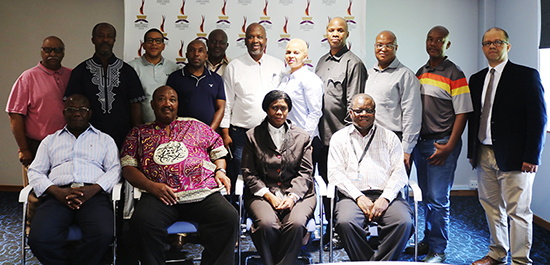
The Minister of State Security, Dipuo Letsatsi-Duba, has said that the Unisa’s Graduate School of Business Leadership (SBL) is a torch bearer of government’s aim in bringing critical education initiatives to South Africa’s military veterans. A focused management and leadership programme recently launched by the SBL for senior military veterans employed as executives in their respective deployments has so far produced promising feedback.

Minister Dipuo Letsatsi-Duba (Minister: State Security) (front, second from right) with military veterans studying at the SBL and SBL staff: Prof Raphael Mpofu (Acting Executive Dean, SBL) (front, right), Prof Roy Ramphal (Acting Academic Director) (left, back), Letsai Mashishi (Acting Director: Executive Education) (fourth from the left, back), Prof Noel Ngwenya (Public Service and Training (fifth from the left, back) & Dr Gavin Isaacs (Chief Operating Officer, SBL) (back, right)
At a meeting held at the SBL this week, military veterans taking part in the Master of Business Leadership (MBL), Master of Business Administration (MBA) and the State Security Executive Development Programme were invited to provide feedback directly to the minister as well as to the programme’s senior administrators from within Unisa and the SBL.
The programme has been developed as part of an initiative of President Cyril Ramaphosa in which Unisa was identified as a strategic partner. The business and leadership training via the SBL is aimed at members and military veterans of, amongst others, the South African National Defence Force (SANDF), the South African Police Service (SAPS), Metro Police and the South African Safety and Security Agency.
The initiative will see 700 students taken through a range of postgraduate and customised executive education programmes over a three-year period. Soon to be included will also be specific interventions targeted at women and young leaders, which will kick off in the second semester this year with a seminar for women leaders in the military.
Letsatsi-Duba said that since 1994 a number of initiatives had been embarked upon by government to provide military veterans with education opportunities that would better equip them when entering the world of business. However, few initiatives were able to produce the desired results.
The minister explained that government initiatives that enable the direct access of senior military veterans to postgraduate business schools have been successfully implemented in countries such as Australia and the United States. In South Africa, this is a first. "Military veterans are highly trained and many have reached senior levels in their deployments, but they lack the necessary qualifications to take the next step in their career development. It is here that business schools can play a vital role. Through the partnership with the SBL I think that we are on the right track. I see Unisa and the SBL as the torch bearers that are leading by example."
Unisa SBL programme leader, Prof Noel Ngwenya, said that military veterans, despite having made large sacrifices for their country, had become the forgotten heroes. "Unisa and SBL is cognisant that the biggest challenge faced by our country is to ensure that all our people have a balanced education. In this context, we must include those people who gave up large portions of their lives towards building a future for our country’s people."
MBA class leader, veteran Sally Dlamini, who is the first female student to have been enrolled in the first intake of the programme, said, "There is a level of enthusiasm and co-operation. We are here to learn. But also something that is important for us, in our groups, is to look at how to plough back. This shouldn’t just be an opportunity to tick a box, it’s about what happens afterwards."
As one of the education co-ordinating committee members involved in providing input and guidance into the veterans graduate training initiative, Cicero Vokwana underscored that the programme was critical on a number of levels. "The insight and past experience that military veterans have gained is not recognised by society. Despite their years of knowledge, including developing strong strategic thinking and business administration skills, they have not had an academic paper to prove their worth. This has had a huge psychological impact on their ability to cross the threshold into the business world. We can see that already training through SBL is giving them a positive outlook that most critically will build up their confidence for their future endeavours."
In providing feedback on the programme, the MBL and MBA students were enthusiastic yet candid on their experiences to date. Besides being imbued with high morale and a willingness to learn, the veterans recognised that there was a period of adjustment and the need to acclimatise to the new learning environment.
MBA class leader, veteran Sally Dlamini, who is the first female student to have been enrolled in the first intake of the programme, said, "There is a level of enthusiasm and co-operation. We are here to learn. But also something that is important for us, in our groups, is to look at how to plough back. This shouldn’t just be an opportunity to tick a box, it’s about what happens afterwards."
* Submitted by Cilla Boucher, Communication and Marketing Specialist, Graduate School of Business Leadership
Publish date: 2019-03-08 00:00:00.0